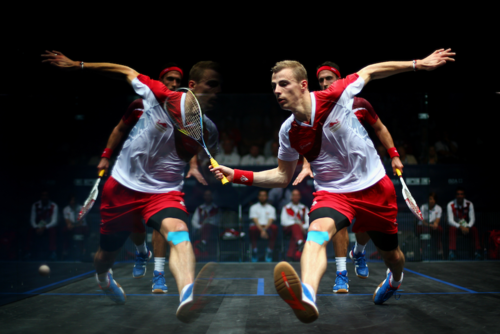Are you fit enough for squash? Three-time world champion Nick Matthew tells us how he’s pushed to his physical limit.
If your matches are harder than training sessions, you’re not working hard enough. I always attempt to go above and beyond what I experience in a match because that gives me the mental strength to tire out my opponent.
In a match you have to contend with the mental aspect you don’t experience in training. That’s why you need to train harder, particularly in replicating the stop- start running involved; you need an extra gear to prevent your opponent getting on top of you.
Every game of squash involves a lot of shuttle runs and the best way to prepare is to do shuttle run after shuttle run, and for a longer duration than you’d have in a typical match. Vary the distances and speeds, too; the running part [of training] is, and should be, brutal – the hardest part. Your legs should be like jelly when you’re finished.
It would be interesting to use a GPS on court, but we dictate sessions using stats that reveal the average length of a match and the time and number of rallies and rally recoveries.
One of the toughest training sessions I’ve ever had was with the England squad, it was so hard I wanted to crawl out of the court. They projected a video of one of my hardest matches on to the back wall and I had to act out the whole match. That’s almost two hours of ghosting, which is really hard without the stimulus of an actual ball or opponent.
It’s easy to go into autopilot when training, but that’s when you need to dig in and try harder. I do this by breaking tough elements into more manageable blocks. It’s not just about having the physical capabilities, it’s about having the mental strength to make the right tactical decisions under pressure. Clarity of thought is essential.
The forces exerted on the body when lunging, twisting and turning are incredible. Many players attempt to replicate those thresholds [in training] but I go harder. Plyometric training allows you to push your body through the necessary forces – the idea is that if you exceed the limits you might experience in a game, you can cope with competitive action more easily. At the same time, you need to balance heavy loads with non- weight bearing sessions. I now do more bike sessions than running. I save my body for the more intense plyometric sessions.
The shoulders take a huge hit thanks to the same repetitive movements with maximum exertion. It’s easy to spend more time concentrating on the recovery of your knees and ankles, but I try and give my shoulders as much rest as possible, too.
The key to big tournaments or matches is not to overhype them. When you’re facing a big game it’s natural to feel more adrenaline, but you have to be careful that doesn’t tire you out. Try to think clearly and simplify stressful situations – it’s still only you and four walls. I do a lot of visualisation. It helps me focus on how I dealt with previous situations and prepares me for future encounters.

